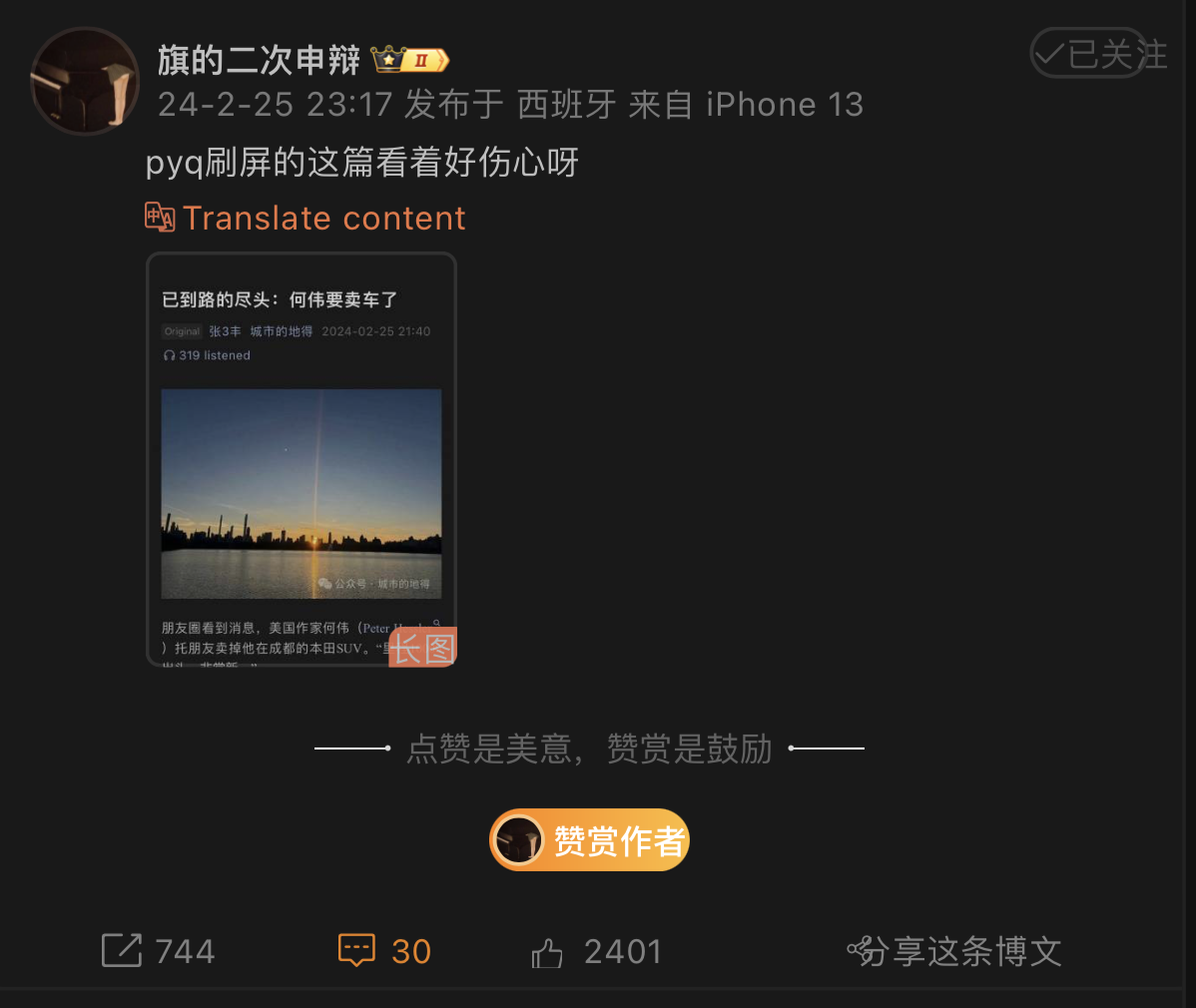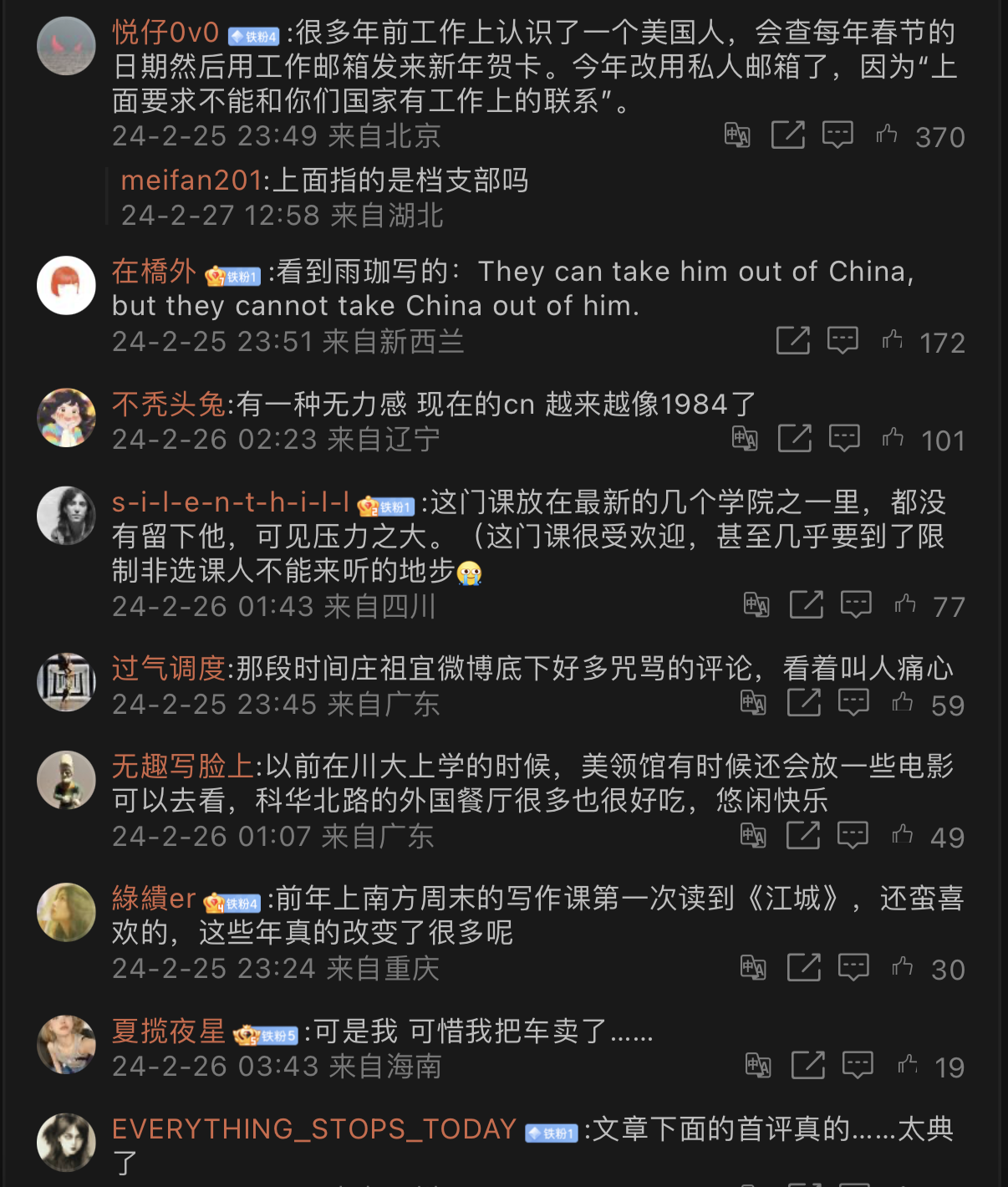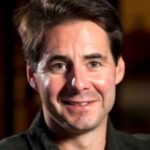Peter Hessler Sells His Car in China
CENSORED ESSAY: PETER HESSLER SELLS HIS CAR
I saw the news on my WeChat Circle: American author Peter Hessler is asking for his friend’s help to sell his Honda SUV in Chengdu. “10,000 kilometers on the odometer. Extremely new.”
This is heartrending news.
When Hessler bought that Chengdu car, he must have been imagining that he’d be in China for a long time, traveling to far flung places. Who would’ve thought, the car’s journey has already reached its end.
[…] Thinking back, I recall that Chengdu was a truly intoxicating city.When Tzu-i Chuang Mullinax, the wife of then US Consul General [Jim Mullinax], and her friends got together a band for Chengdu street performances, nobody paid them any extra attention due to her background, nor was it considered particularly sensitive. She’s a chef, and Chengdu once considered itself a culinary capital. In fact, most people didn’t even know who she was; they were moved solely by her music—she sang children’s songs.
Students could once peacefully listen to Petter Hessler lecture from a Sichuan University podium on his thoughts on the art of writing. Remember, to some extent, this is the highest level that a city can achieve: open, tolerant, and—more importantly—self-confident.
[…] Hessler has already been gone for some time now, that car of his awaiting his return in some apartment complex’s parking garage. Now he’s selling it publicly, meaning his dreams of exploring China behind the wheel of that car have formally come to an end. [Chinese]

A screenshot of a Weibo user sharing Zhang Feng’s censored essay.

A screenshot of Weibo users lamenting Hessler’s departure.
Censors took down the essay but screenshots of Zhang’s piece circulated on Weibo. One post sharing Zhang’s piece was captioned “This essay I read while scrolling my WeChat Circles really broke my heart.” A commenter replied, “I feel powerless. Today’s China resembles ‘1984’ more every day.”
Zhang Feng wrote a follow-up essay after his first piece was censored. In that piece, which remains live as of publication, Zhang wrote that Hessler’s real gift was providing Chinese readers with an American perspective of China:
Yesterday’s essay, “Peter Hessler Sells His Car,” is no more, as was to be expected.
[…] Was his understanding of China “correct”? Or “deep”? That’s all beside the point. China is so complicated as to preclude a simple answer to those questions.That being said, one thing is certain: his understanding of China was widely resonant.
Hessler’s importance stems from him granting the Chinese people a lens: “So this is what China looks like to an American.” This perspective provided many with a sort of out-of-body experience that was warm and encouraging and rich with humor.
As far as readers are concerned, that’s the most precious moment. As [the creator of pinyin] Zhou Youguang stressed: “We must view China from the world, rather than view the world from China.” Practically speaking, as a Chinese person, when leaving the country is difficult and you’re not well versed in foreign languages, how is one to view China from the world? Peter Hessler was a heaven-sent pair of eyes, sharing wisdom with us all. [Chinese]
Although the essay itself was not censored, a new tool from Citizen Lab that tracks keyword search censorship across Chinese platforms found that its mention of Hessler’s writing on Wu Ningkun and the book “A Single Tear,” which Wu co-authored with his wife Li Yikai, tripped censorship across a number of Chinese platforms. All searches for Wu plus “A Single Tear” were censored on the discussion forum Baidu Zhidao, while the search engines Baidu and Sogou “soft censored” them by limiting returned results to authorized sources only. To learn more about how these censorship rules were discovered, see the Citizen Lab report “Missing Links: A comparison of search censorship in China.”
Not all remembrances of Hessler were as rosy as Zhang Feng’s. In a response essay to Zhang’s censored essay, the veteran reporter and editor Sun Xuyang wrote of his disillusionment with Hessler’s seeming endorsement of China’s strict COVID containment regime in a 2020 piece Hessler filed with The New Yorker. (Hessler’s reporting was subject to withering criticism from many corners of the China-focused world, notably in Geremie Barmé’s essay “The Good Caucasian of Sichuan and Kumbaya China.”) In Sun’s essay on Hessler, he wrote of both Hessler’s “ignorance and naivete” while acknowledging his importance to certain segments of the Chinese intellectual community and Hessler’s immense talents:
During the Masking Era [2020-2022], Hessler wrote a few essays that came under fire from his readers who felt that he was overly partial to coercive COVID control measures. I read an essay he published in The New Yorker and was deeply disappointed to see what Hessler had written:
“From my perspective, there are also issues of education and effort. Despite the political indoctrination involved in Chinese schooling, the system teaches people to respect science. Hard work is another core value, and somehow society has become more prosperous without losing its edge.”
Few writers can combine reportage and opinion with the deftness of Orwell. The above from Hessler is a full manifestation of Hessler’s ignorance and naivete about certain dimensions of China.
I vowed to no longer read his writing.
That the same man [who put narrative non-fiction on the map in China], a Chengdu resident who views Fuling [Hessler’s Peace Corps site] as his ancestral village, could experience the red armband-sentries, the corrugated metal walls, the endless PCR swabs, the temperature checks, and the QR code scans and yet still defend them, is actually understandable.
There is a Stockholm in every person’s heart.
[…] As such, evaluating Hessler is tricky. To some, he’s an annoyance. He’s well-meaning but, in certain environments, faithful reporting can be perceived as malicious.For Zhang Feng and others, Hessler was a weathervane, a canary in the coal mine. He was proof that not everything had totally collapsed. That in this increasingly unforgiving land, there is still some consensus that allows a person—even a foreigner—to diverge from the mainstream narrative, to provide a veneer of civilization, and to retain a bit of dignity.
Hessler is not deserving of malice or hope. His departure is fine. With his talents, the entire world is a stage. [Chinese]

all writers wrestle with their own opinions. It’s best to ignore the naysayers and follow your intuition.
Indeed.
I couldn’t agree more. After spending a lifetime learning a new language and much of what makes China unique, Hessler has something important to say and teach. Sometimes we learn things from those who disagree, but naysayers shouldn’t limit our willingness to express our opinion.
you are truly a just right webmaster. The site loading speed is incredible. It kind of feels that you’re doing any distinctive trick. In addition, The contents are masterwork. you have done a great activity in this matter!